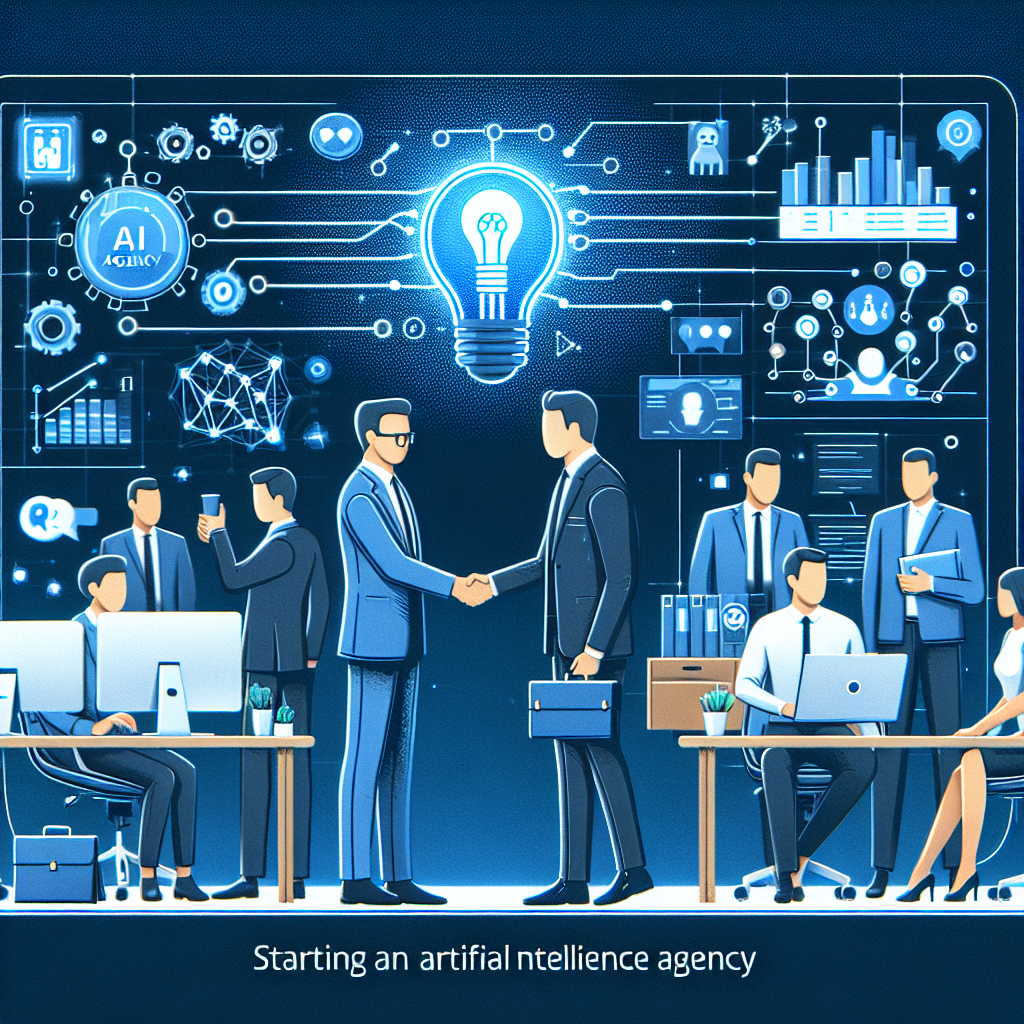Launching Your AI Agency: A Comprehensive Guide to Landing Your First Client
In the rapidly evolving landscape of artificial intelligence and automation, starting an AI agency can be both exciting and daunting. The key challenge for many aspiring entrepreneurs is landing that *crucial* first client when you have no prior track record or social proof. This comprehensive guide will explore proven strategies to overcome this hurdle, drawing insights from industry experts and successful AI agency founders.
We’ll delve into practical tips for building credibility, leveraging your existing skills, and crafting compelling pitches that resonate with potential clients. By the end of this article, you’ll have a clear roadmap for launching your AI agency and securing your first paying customer, even if you’re starting from scratch.
The Growing Opportunity in AI Services
Before we dive into specific strategies, it’s *important* to understand the immense potential of the AI services market. According to Industry Research Institute 2024, the AI market is expected to grow by 15.3% annually through 2025. This rapid expansion creates a wealth of opportunities for new entrants in the field.
Furthermore, the adoption of AI technologies is accelerating across industries. Technology Trends Report 2024 indicates that AI adoption has increased by 45% since 2023. This surge in demand means that businesses of all sizes are actively seeking AI expertise, creating a fertile ground for new agencies to establish themselves.
“The integration of AI has become *essential* for companies looking to remain competitive in today’s market.”
Lisa Chen, Strategic Business Consultant at Innovation Partners LLC
Building Credibility Without a Track Record
One of the most *significant* challenges for new AI agencies is establishing credibility without a portfolio of past clients. However, there are several effective strategies to overcome this obstacle:
1. Leverage Personal Projects and Case Studies
Start by developing AI solutions for your own needs or creating hypothetical case studies. This approach allows you to showcase your skills and problem-solving abilities without the need for actual clients.
“So long as you built all these things for yourself first, like you’re pretty good, right? You have actually gone through and you’ve done the building.”
Nick Saraev
2. Offer Guarantees to Build Trust
When approaching potential clients, consider offering guarantees on your services. This demonstrates confidence in your abilities and reduces the perceived risk for the client.
“Just offer a guarantee. Offer a guarantee on your service. Just say, ‘Hey, you know, forget trust. I don’t want this to be like a sales pitch. I want you to feel this on both an emotional level. I want you to like me, and I want you to feel like I’m going to do a good job for you.'”
Nick Saraev
3. Engage in Community and Thought Leadership
Actively participate in AI forums, contribute to open-source projects, or start a blog sharing your insights on AI trends and applications. This helps establish you as a knowledgeable voice in the field, even without a long client list.
Crafting a Compelling Value Proposition
To stand out in a competitive market, it’s *crucial* to develop a clear and compelling value proposition for your AI agency. Here are key elements to consider:
1. Focus on Tangible Business Outcomes
Rather than emphasizing technical jargon, highlight the concrete business benefits of AI implementation. According to Business Analytics Quarterly, 73% of businesses implementing AI strategies see improved performance within 6 months. Use statistics like these to illustrate the potential impact of your services.
2. Tailor Your Approach to Specific Industries
Develop expertise in particular sectors or business functions where AI can have a *significant* impact. This specialized knowledge can set you apart from generalist competitors.
3. Emphasize Cost Savings and Efficiency Gains
Highlight how AI solutions can lead to operational efficiencies and cost reductions. Enterprise Technology Survey 2024 reveals that companies utilizing AI technologies report 28% higher efficiency rates.
“What we’re seeing with AI is not just a trend, but a fundamental shift in how industries operate.”
Michael Thompson, Senior Industry Analyst at Global Business Insights
Strategies for Landing Your First Client
With a solid foundation in place, it’s time to focus on specific tactics for securing that *crucial* first client:
1. Leverage Your Network
Start by reaching out to your existing professional and personal networks. Even if they’re not in need of AI services themselves, they may know someone who is. Word-of-mouth referrals can be incredibly powerful for new businesses.
2. Offer Free Consultations or Audits
Provide potential clients with a no-obligation AI readiness assessment or consultation. This gives you an opportunity to demonstrate your expertise and identify potential areas where you can add value.
3. Consider a Discounted Pilot Project
For your first client, consider offering a discounted rate or a small-scale pilot project. This lower-risk engagement can lead to a larger, long-term contract if successful.
4. Utilize Online Platforms and Marketplaces
Explore freelance platforms and AI-specific marketplaces to find businesses actively seeking AI services. While competition may be high, these platforms can provide valuable exposure and opportunities to build your portfolio.
Overcoming Common Objections
As you pitch your services, you’re likely to encounter various objections from potential clients. Here’s how to address some of the most common concerns:
1. Lack of Experience
When faced with questions about your track record, focus on your technical skills, education, and any relevant projects you’ve completed, even if they weren’t for paying clients.
2. Cost Concerns
Emphasize the return on investment (ROI) of AI implementation. Use industry statistics to illustrate the potential for cost savings and revenue growth. For instance, Market Research International projects that global spending on AI solutions will reach $2.4 billion by 2025, indicating the growing recognition of AI’s value in the business world.
3. Implementation Challenges
Address concerns about the complexity of AI integration by outlining your step-by-step approach and emphasizing your commitment to providing ongoing support and training.
Nurturing Client Relationships for Long-Term Success
Once you’ve landed your first client, it’s *crucial* to focus on delivering exceptional results and building a strong relationship. This not only increases the likelihood of repeat business but also opens the door to valuable referrals.
1. Communicate Regularly and Transparently
Keep your client informed about project progress, challenges, and successes. Regular check-ins and progress reports help build trust and demonstrate your commitment to their success.
2. Provide Ongoing Education
Help your client understand the AI solutions you’re implementing and how to maximize their benefits. This educational approach positions you as a valuable partner rather than just a service provider.
3. Seek Feedback and Continuously Improve
Regularly solicit feedback from your client and use it to refine your processes and services. This commitment to improvement will set you apart in a rapidly evolving field.
“The future of AI lies in understanding the intersection of technology and human behavior.”
Dr. Sarah Mitchell, Technology Innovation Specialist at MIT Technology Review
Looking Ahead: The Future of AI Agencies
As you embark on your journey to build a successful AI agency, it’s *important* to keep an eye on emerging trends and future opportunities in the field. The AI landscape is constantly evolving, presenting both challenges and exciting possibilities for agencies that stay ahead of the curve.
Some key areas to watch include:
- Ethical AI and Responsible Development: As concerns about AI bias and privacy grow, agencies that prioritize ethical AI practices will be well-positioned to win client trust.
- Specialized AI Solutions: Developing expertise in niche applications of AI, such as natural language processing or computer vision, can help differentiate your agency in a crowded market.
- AI-Human Collaboration: Focus on solutions that enhance human capabilities rather than replace them, as this approach is likely to see growing demand across industries.
Conclusion: Taking the First Step
Launching an AI agency and landing your first client may seem daunting, but with the right approach, it’s an achievable goal. By focusing on building credibility, crafting a compelling value proposition, and leveraging both your technical skills and interpersonal abilities, you can overcome the initial hurdles and establish a foundation for long-term success.
Remember, every successful agency started with that *crucial* first client. By following the strategies outlined in this guide and staying committed to continuous learning and improvement, you’ll be well-equipped to navigate the exciting and rapidly evolving world of AI services.
The opportunity is vast, with AI adoption accelerating across industries and businesses of all sizes recognizing the transformative potential of these technologies. Now is the time to take action, leverage your unique skills and insights, and embark on your journey to build a thriving AI agency.





Leave a Reply